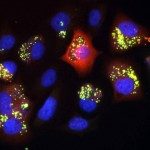Link to Pubmed [PMID] – 14702398
Microbiology (Reading, Engl.) 2004 Jan;150(Pt 1):61-72
In several Gram-positive and Gram-negative bacteria glutamate decarboxylases play an important role in the maintenance of cellular homeostasis in acid environments. Here, new insight is brought to the regulation of the acid response in Escherichia coli. Overexpression of yhiE, similarly to overexpression of gadX, a known regulator of glutamate decarboxylase expression, leads to increased resistance of E. coli strains under high acid conditions, suggesting that YhiE is a regulator of gene expression in the acid response. Target genes of both YhiE (renamed GadE) and GadX were identified by a transcriptomic approach. In vitro experiments with GadE purified protein provided evidence that this regulator binds to the promoter region of these target genes. Several of them are clustered together on the chromosome and this chromosomal organization is conserved in many E. coli strains. Detailed structural (in silico) analysis of this chromosomal region suggests that the promoters of the corresponding genes are preferentially denatured. These results, along with the G+C signature of the chromosomal region, support the existence of a fitness island for acid adaptation on the E. coli chromosome.


